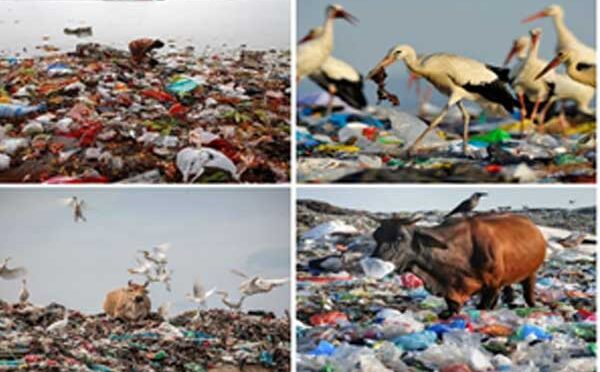Ban on Single-use of Plastic Items in India: A Wise Step Towards Clean Environment
Posted on : November 23, 2021Author : AGA Admin

“One step for a better environment today is one step toward a better future tomorrow”.
We always seem to be looking for the next great solution for all of our global problems. With bewilderment, we stare at the monumental challenges ahead, trying to comprehend how it is even possible to find a solution for global warming, plastic pollution, mass extinction and all the other great issues of our time. Discoveries and inventions in the field of science have provided many things to man and industries. Plastic is one among those. Growth of plastic has been so rapid that it has engulfed so many natural things which is danger to the environment. Now the plastic made goods are in use in every nook and corner of the society from our smartphones to computers to medical devices. The development of plastics started with the use of natural materials that had intrinsic plastic properties, such as shellac and chewing gum. The next step in the evolution of plastics involved the chemical modification of natural materials such as rubber, nitrocellulose, cellulose, collagen. Finally, the wide range of completely synthetic materials that is recognized now as modern plastics started to be developed around 100 years ago.

Single use plastic is very harmful for human beings, animals, marine creatures and hydrophytes. In the water bodies, aquatic animals mistakenly consume plastic particles along with their food. Many marine animals including fishes, sea birds, turtles are found to have plastics in their stomach. These plastics, pierce the organ of animals and block the digestive systems resulting in serious health problems and causing death.
The Union government in a bid to free India of single-use plastics by 2022, has laid out a multi-ministerial plan to discourage the use of single-use plastics across the country, keeping in view the adverse impacts of littered plastic on both terrestrial and aquatic ecosystems. The Ministry Of Environment Forest And Climate Change has notified the Plastic Waste Management Amendment Rules, 2021, that prohibit specific single-use plastic items which have “low utility and high littering potential” by July 2022. “Pollution due to single-use plastic items has become an important environmental challenge confronting all countries,” the ministry said. In the 4th ‘United Nations Environment Assembly’ held in 2019, India had piloted a resolution on addressing single-use plastic products pollution, recognizing the urgent need for the global community to focus on this very important issue. The adoption of this resolution at UNEA-4 was a significant step. The government has also asked the states and Union Territories to develop a comprehensive action plan to eliminate single-use plastic items.
The manufacture, import, stocking, distribution, sale and use of following single-use plastic, including polystyrene and expanded polystyrene, commodities shall be prohibited with effect from July 1, 2022: Ear buds with plastic sticks, plastic sticks for balloons, plastic flags, candy sticks, ice-cream sticks, polystyrene (Thermocol) for decoration; plates, cups, glasses, cutlery such as forks, spoons, knives, straw, trays; wrapping or packing films around sweet boxes, invitation cards, and cigarette packets, plastic or PVC banners less than 100 micron, stirrers. In order to stop littering due to lightweight plastic carry bags, with effect from 30th September, 2021, the thickness of plastic carry bags will be increased from 50 microns to 75 microns from September 30, 2021, and to 120 microns from December 31, 2021. This will also allow reuse of plastic carry bags due to increase in thickness.
The plastic packaging waste, which is not covered under the phase-out of identified single-use plastic items, shall be collected and managed in an environmentally sustainable way through the Extended Producer Responsibility of the Producer, Importer and Brand Owner (PIBO), as per Plastic Waste Management Rules, 2016. For effective implementation of Extended Producer Responsibility, the Guidelines for Extended Producer Responsibility being brought out have been given legal force through Plastic Waste Management Amendment Rules, 2021. The waste management infrastructure in the States/UTs is being strengthened through the Swachh Bharat Mission. The “India Plastic Challenge-Hackathon 2021” is a unique competition calling upon start-ups/entrepreneurs and students of Higher Education Institutions (HEIs) to develop innovative solutions to mitigate plastic pollution and develop alternatives to single-use plastics.
The Covid-19 pandemic has made the battle against plastic tougher which given the rise in PPE kits and disposable masks. But the war against single-use of plastic has been going on for decades. Like every other segment of Indian society, the rules exist, but there is no implementation. The polluters continue to pollute, and the dump yards grow higher by the minute. Unless there is strong data to support which product needs to be banned and how to go about it, besides putting existing rules into effect, India’s plastic crisis will be far from over. It’s too late for recycling alone to resolve the global plastic crisis. The recycling mark may be among the most recognisable symbols in use today, but we must be mindful that plastics recycling has its limitations. With the rate of plastic production only rising, there’s an urgent need for businesses and governments alike to champion other answers to the crisis that include a shift away from plastic towards alternatives, including compostable packaging, will make a significant difference.
-Rwittika Ghorui,
Intern, Asia in Global Affairs
References
1. “Manufacture, sale & use of single-use plastic banned in India from July next year”, PTI, The Print. 13th August, 2021.
- Nidhi Adlakha, “India’s toxic love affair with plastic: on the 2022 ban against single-use products”, The Hindu. 17th September, 2021.
- Jayashree Nandi, “Centre notifies ban on single-use plastic”, Hindustan Times, New Delhi. 14th August, 2021.
- “These Single-Use Plastic Items will be Banned from July 1 Next Year”. NDTV. 14th August, 2021.
5. “Indian moves to phase out single-use plastic items by 2022”, Firstpost. 20th August, 2021.




